- Home
- Robert Graves
Wife to Mr. Milton Page 3
Wife to Mr. Milton Read online
Page 3
Two such lean old wretches whom he had found at The Mop, he plied well with ale and brought home with him stretched along the floor of his old coach. It was there also that he found my dear Trunco standing disconsolate, a little apart from the rest, her babe in her arms. Her husband, a brewer of Abingdon, was lately dead of the plague, which had raged fearfully that year in his town. When his debts were paid, there was nothing left for Trunco’s support; and being thus cast back upon the parish of her birth, and having no great skill either with the mop or with the needle, she was sent by the parish officers to the Fair to hire herself as a wet-nurse to some rich family, for she had milk enough for two babes. My father, judging her to be a healthy, honest woman, immediately engaged her and packed her in the coach with the old men; item, a turkey-cock with two hens, item, a spotted pig, item, a dozen of young ducks which he had bought. I remember how he came stamping into the house very late that night, a little drunken, hillooing and swearing he had sprung a rare variety of game at The Mop, from ducks and turkey-birds to young nymphs and old satyrs.
Trunco’s child died not long afterwards, of a cough. To me she was thereafter more devoted than to any other soul, even to her foster-child George; for when one day a fellow-servant accused her to my mother of the theft of some trifling braid or ribbon, and my mother was for whipping Trunco well, I interceded for her. I undertook to be a surety for her good behaviour and declared that for certain she was no thief; whereas Agnes (the maid who had accused her) was by no means above suspicion. Trunco’s innocence came to light before long and she was rewarded with a position of greater trust, being appointed our stilling-room maid. Then her wages were raised to £3 per annum, for she proved to have a pretty art in distilling simple waters of wild herbs and garden flowers—as also the Snail-water, the Bezoartis, the Hiera Picra, the Mithridate for melancholy, the Aqua Mirabilis, and such-like curious medicinal waters, of which she knew the virtues as well as did any apothecary. She was, besides, given charge of the pewter and the silver, to see that it was kept bright and no piece lost or nimmed. To Trunco I opened my heart freely enough, for I could trust her beyond any of my own family, my brother James alone excepted.
It was Trunco who wakened me, on the day after my birthday, and told me that it was high time to be stirring, for this was a working day and Zara was already risen; and that my mother had missed my face at breakfast and looked vexed. Trunco waited awhile for me to speak to her, and when I said nothing, she began to pump me. She asked me: “Well, my fine lady, and did no gentleman yesterday offer you his heart smoking on a pewter dish? Nor did none even ask leave to speak a few words to his Worship, your father?”
I answered faintly: “One only put the matter to the touch, dear Trunco, and he not the right one, neither. You had promised me four at the least.”
“Who then may the right one be, my young lady?” Trunco was saucy enough to ask me.
“I have an headache, Trunco,” I answered her. “Do not torment me, pray. My head goes round and round.”
She asked my pardon, and went out and fetched me a red-currant cordial which warmed my stomach, and some white bread, with curds in a bowl, which strengthened me a little. I put on my woollen working gown and my worser shoes and came slowly down the stairs. The house had already been swept and set somewhat to rights, and of the three drunken gentlemen on the couch but one remained, who was sitting upright; he looked foolish enough, being dressed like Hercules in flesh-coloured hose and close-fitting jerkin, with a lion’s skin fastened around his neck with a brass button. A cart with hurdles laid upon it came rolling into the yard. As I saw through the window, it was no longer decorated with Christmas greenery, except for a little bush of holly, tied to one wheel, which had been forgotten.
“So Marie Mischief, you are come downstairs at last!” my mother bawled at me from the pantry. “I have needed ten hands all this morning, yet have but two. Go at once into the fowl-house and see whether the young chickens and the larger poultry be not starved to death. They are for our eating in a week’s time, and if they are not sufficiently fat by then, you know well, my jolly daughter, whose sides will be thumped.”
I went out into the yard, where my father, with his back turned to me, stood gazing at the wreck of the thatched shed. He was saying to his bailiff: “It will not serve again for a shed, I fear. Have this old thatch laid aside; it shall be spread as dressing on the piece of ground, below the orchard, where the geese now are pastured.”
My head ached so, I did not greet my father, but passed by in silence.
In the fowl-house we had coops, made with divisions, each fowl apart from its neighbour, and not room to turn in, but with means to cleanse their droppings from behind; and for each fowl was set a porringer for food and a pottle for drink. The food I gave them was barley, boiled tender, some days in water, some days in milk, and some days in ale, for variety; but always I mixed it in the porringer with a little brown sugar. In the pottles I poured strong ale by day, so that the fowls were very drunk and stirred not much, for much stirring makes fowls lose flesh, and by night they had fresh water, and a candle burned all night above the coops to keep them from sleep. Then they would drink much because of the thirst that the ale gave them, and eat much because of the hunger that the water gave them. With this course they grew prodigious fat in a fortnight. As for the chickens, of whom I kept six in each coop, they had another diet, which was rice boiled in milk so thick that almost a spoon might stand on end in it, and sweetened with kitchen sugar at sixpence a pound. I would put this before them every day for a fortnight, mixing with the rice a little bran to keep their maws clean; so that their flesh should be white and of a pure taste. Then for five days more I would give them dried raisins, pounded in a mortar, and then mixed with milk and the grated crumbs of stale white bread. They profited at night from the same candle that burned for the fowls, and delight of the raisins made them eat continually. When they came to their height of fat, they were then eaten, for if they lived longer they would lose appetite and fall off; but at the height of their fat they were exceeding good to eat, especially in a fricassee, fried first in butter, with white wine, savoury herbs and endives. It was now the second day of their diet of raisins and they were about the bigness of a blackbird, yet so fat that they could no longer stand, but grovelled upon their bellies to eat.
When I came to the fowl-house, I found the candle already blown out; and the barley and ale duly set before the fowls, that were eating greedily; and the raisin mess set before the young chickens. This was Trunco’s work, and I must thank her for her kindness. I returned to the house, going in by the door of the pantry, where I hoped to find Trunco; but she was not there, and I went to seek her in the kitchen.
There was a stench of stock-fish frying at the fire, and of garlic being bruised, and as I came in at the door I began to feel as giddy as a spinning-top and tottered upon my legs. Then I sneezed twice, and the cook-wenches held up their hands and all cried together: “The Lord preserve you, my young Mistress!” At that I vomited up the red-currant cordial, the bread and the curds, and O, then, what a scurry in the kitchen! A little cook-wench whipped past me and out into the yard; the greasy cook dropped upon his knees and began a long litany of prayers; and I stood there feeling silly until, turning to go, I fell down along the floor.
Now, the plague, that had been so severe in this country in the year before I was born, by which above 30,000 people died in London alone, had returned four years before this and destroyed ninety persons in Abingdon, which lies not many miles from us to the southward. Oxford, with the places thereabouts, is salubrious and has always felt the rage of the plague less than other cities, but we stood not the less in terror of it. This year it was again in London; and two brothers of my mother, Archdales of Wheatley, had spent Christmas Day with us, coming from Moorgate, a parish of London said to be infected; of whom one, my uncle Cyprian, had fallen sick and cut short his visit, being taken back in his coach to his place at Wheatley that he mig
ht not be a burden to us over the holidays. Imagine, then, what noise and confusion ensued in the household, when I sneezed and fell down fainting along the floor, and when it was recalled by the cook that, on the morning before, I had come to him for a lump of dried figs to plaster a swelling beneath my arm. It was thought evident, as evident as the teeth of a cur when he curls his lip, that I had taken the plague.
Zara with my young brothers and my little sisters Ann and Bess ran out of the house, to peep in at the kitchen window and gaze on me as I lay there. My father stood in the doorway, perplexed, and crossed himself in amazement, like a Papist, making sometimes to come forward and take me up from the floor, but as often making better thought of it and shrinking back again.
My mother, as it happened, was no longer within doors, and they could not find her. She had run half a mile down the road, after a carter, shouting and swearing that he had not delivered the full measure of flour certified in the bill he brought from Tomlins of the Mill. My Aunt Moulton was ridden to Oxford, my elder brothers were out coursing with their greyhounds towards Elsfield and, besides my father, nobody with any more head than a pin remained in the house, but only Trunco. When they told Trunco: “The eldest young lady is tumbled down with the plague in the kitchen and lies there senseless,” she stood not still for a moment of time, but ran immediately and came in and threw me upon her shoulder and carried me to my bed, the servants and others fleeing away before her, like poor villagers before a troop of dragoons at pillage.
Now there was love for you! Yet I cannot have it thought that I would write anything against my own father, for indeed his was a very difficult case. Since upon his continued fife and health depended the fortunes of ten others of his children, beside myself, he was unable to justify the first motion of his mind, which was to risk the contagion and take me up in his arms. For my part, I think that it stands more to his credit as a father that he refrained and left me lying there, rather than that, by over-fondness for me, he should have risked to infect himself and so bring ruin on the whole house.
I knew nothing of all this until afterwards; nor of the grand suffumigation of the house with sulphur, which my mother put into motion when she came in again; nor of the hasty messages of warning that were sent out to our Twelfth-night guests; nor of the marshalling of our whole household to be doctored with the plague-water, of which Trunco had distilled a gallon or two the year before, concocting it for the most part of simples which she had set the children to gather in the fields.2
After the hue and cry was raised, that evening the parish officers came with a physician to certify my case. But Trunco had by now pulled off my clothes and made an examination of my body, before she put my warm night-gear on me; and she had something to say to the physician when he came into my chamber (though most unwillingly), smelling a lemon against the contagion and keeping close to the door. “Sir,” says she, “my poor husband died of the plague four years ago, and his sister too, and I nursed them to the end and buried them both and I have no fear of the plague; for the Lord, I believe, has made me proof against it. I know the signs and marks of the plague, I dare swear, as well as any physician in England; and if you accuse my poor lamb of being stricken of the plague, that is very false. True, your Honour, she has sneezed and vomited and lies here in high fever, and true, she has a little swelling and a redness under her right arm-pit, where the bubo or carbuncle or what-d’ye-call-it usually appears. But my meaning is: seeing that the swelling rose when she was otherwise in perfect health, for she dressed it with a fig-poultice yesterday morning, after she had ate a hearty breakfast of veal collops and three eggs, why, I judge it to be no true plague-carbuncle, but an imposture of an altogether other nature. I believe, your Honour, that this sickness is no more than a fever that she caught last night, lolling or loitering in a cold place after she had over-heated her body in the dance. As for the redness, it proceeds doubtless from the fig-poultice clapped on when it was scalding hot; moreover, as I can show your Honour, the swelling is seated lower and more forward on the ribs than is usual with the plague.”
The physician, grown a little bolder, came nearer, and pulled up my shift, and he tried the swelling with a lancet from his bag. He probed about awhile and presently lifted out a little splinter of thorn-wood, which was the apparent cause of the swelling and perhaps also the cause of the fever. This I had got a few days before when, in a chase with my brothers, I had leaped my horse over a bank where a thorn-tree grew; three or four thorns had pricked through my gown under the arm, as I threw up my whip-hand to cover my face.
The physician now had pleasant news to take out with him to my mother, who waited on the stairs, in a distraction, swinging a pot of stinking sulphur. Yet when she heard it, and he showed her the thorn-splinter resting on the point of his lancet, she flew into a passion and cast the sulphur-pot through the window and blessed me backwards, and cried that her good hangings and clothes were spoiled and well-nigh ruined by the grand suffumigation she had given them. Moreover, some of the servants had run off for fear, and were five parishes distant by this time, and what was worse, the cook lay in a fit, with a light froth at his lips, who was a very master of his trade especially for pies and hotch-pots. And what servant or tenant remained to send after the several messengers who had ridden off with warnings of the plague to the gentlemen’s houses? And how many of the said messengers would venture to return?
However, by the week’s end, all was again smooth and peaceable at the Manor, and I had so far recovered from my sickness that I could sit upright in my bed with cushions set behind me, and take gruel with little sops of bread.
Trunco nursed me all this while and would let none come near me, except once a day my mother, and would not permit even her to stay long, or to chide me for the trouble I had brought on the house. Says Trunco: “Madam, when your daughter was thought to have the plague, all the household fled from her, but only your woman Trunco; who now, by your kind permission, claims a natural right to nurse her through this sickness, with caution and advice from none.”
My mother huffed and snuffed at this plain speaking, but she granted Trunco’s plea, on condition that she cured me speedily; which Trunco undertook to do before the month was out. Being armed with this authority, Trunco also resisted the physician when he would have bled me of a pint and a half of blood. She contended that in January, when the forces of the body are weak and Nature hoards her sap, it would be murder to take so much as a thimble-full from me; and she cast at him such a tigress look that he was wise and altered his intentions. She also drove away the curate, the Reverend John Fulker, who would have prayed over me. “Go off,” says she, “little Reverend Sir, and pray instead with Molly Wilmot, who I think will presently have need of your best prayers and sermons too.” This Molly Wilmot was a tenant’s daughter, an airy flirtish piece, and it was commonly said, though perhaps with more malice than truth, that the curate knew her body in a larger manner than he knew that of his own wife. The Reverend Fulker turned red, looked foolish, and left us in peace again. It was my father who paid the curate his £20 yearly; for the rectory went with the Manor.
Trunco treated me marvellous kind, and continued at my side night and day, stroking my head, turning my pillow, laying hot bricks wrapped in woollens to warm my feet if they were cold, and commanding jellies and other delicacies from the kitchen, whatever she thought would tempt my palate. If my little brothers were noisy on the stairs, or in their study (which lay next door), she would fly at them with her fists, and after a while they became exceedingly careful not to offend her. Thus, when my fever had abated, I passed there some of the pleasantest days of my life, and grew plump and merry.
I asked Trunco whether I had spoken wildly in my delirium—was I frantic, had I said what I should never have said, had I disclosed what modesty ought to have concealed?
“O no, my dear,” says Trunco, “you were at all hours sweet discretion itself!”
“I mentioned no gentleman’s name, did I,
my Trunco,” I asked, “not in any way that seemed strange to you? I spoke no foul, ugly nonsense?”
“There was nobody here, in any case, to listen but myself,” she says, “and what I heard I have forgot. But I swear to you, my little mistress, that so far from my hearing any ugly, frantic nonsense from your lips, it was the prettiest deliration that ever I listened to. Indeed, your ravings were more delightful than many other women’s rational conversation. Nay, nay, I have altogether forgotten their purport, except only that you came back always to talk of sweet primroses and violets.”
This was Trunco to the life, for certain I am that I spoke a thousand foolish things about a certain gentleman whom I have here not yet named.
***
Well, in my vellum-book I wrote of him as “M,” but here I need give him no enigmatic alias, but may write his name in full. “M” stood for “Mun,” which was short for Edmund, and Verney was his family; he was third son to Sir Edmund Verney, of Claydon in the County of Buckinghamshire, the King’s Knight-Marshal and Standard-Bearer. Some years before this, when he was an undergraduate at Magdalen Hall in Oxford, he had two or three times come to our house at the invite of my brother Richard, with whom he would go coursing. Now it may seem absurd and almost against nature that I, a child of but eleven years old, should have fixed my affections so steadily on a man near ten years older than myself; but so it was, and if it were a fault, yet time mended it.

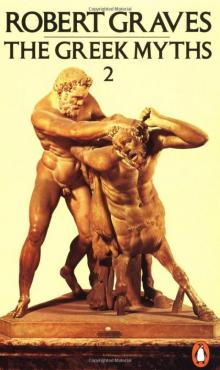 The Greek Myths, Volume2
The Greek Myths, Volume2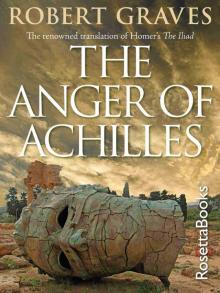 The Anger of Achilles: Homer's Iliad
The Anger of Achilles: Homer's Iliad Count Belisarius
Count Belisarius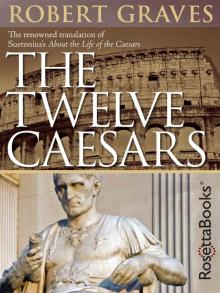 The Twelve Caesars
The Twelve Caesars Complete Poems 3 (Robert Graves Programme)
Complete Poems 3 (Robert Graves Programme) Homer's Daughter
Homer's Daughter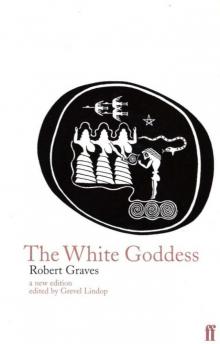 The White Goddess
The White Goddess Goodbye to All That
Goodbye to All That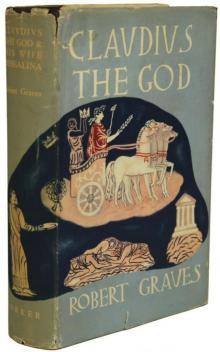 Claudius the God and His Wife Messalina
Claudius the God and His Wife Messalina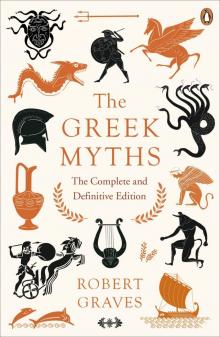 The Greek Myths
The Greek Myths I, Claudius
I, Claudius The Islands of Unwisdom
The Islands of Unwisdom Complete Short Stories
Complete Short Stories The Golden Fleece
The Golden Fleece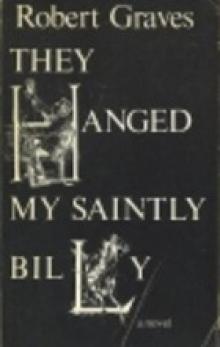 They Hanged My Saintly Billy
They Hanged My Saintly Billy King Jesus
King Jesus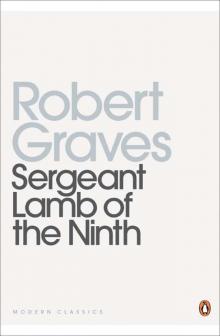 Sergeant Lamb's America
Sergeant Lamb's America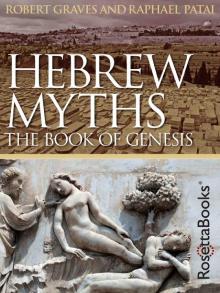 Hebrew Myths: The Book of Genesis
Hebrew Myths: The Book of Genesis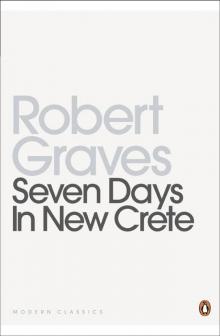 Seven Days in New Crete
Seven Days in New Crete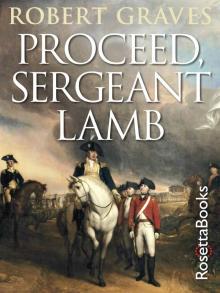 Proceed, Sergeant Lamb
Proceed, Sergeant Lamb Claudius the God
Claudius the God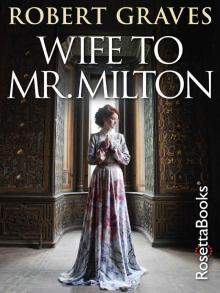 Wife to Mr. Milton
Wife to Mr. Milton The Complete Poems
The Complete Poems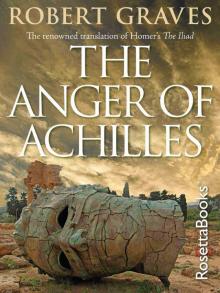 The Anger of Achilles
The Anger of Achilles Claudius the God c-2
Claudius the God c-2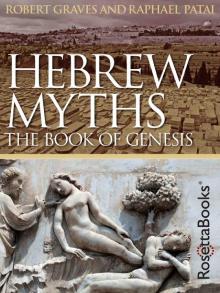 Hebrew Myths
Hebrew Myths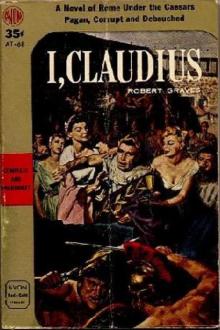 I, Claudius c-1
I, Claudius c-1 The Greek Myths, Volume 1
The Greek Myths, Volume 1